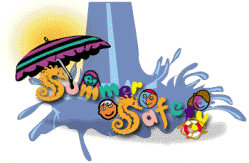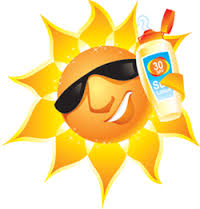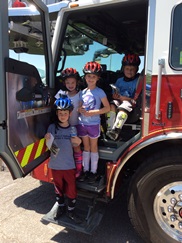
Warm weather brings more opportunity for outdoor activities. Whether they are young children or teens, or adults keep your family safe and healthy while you enjoy the summer fun.
Bugs and Insects
- Don't use scented soaps or pefumes.
- Avoid areas where insects nest or congregate, such as stagnant pools of water, uncovered foods and gardens where flowers are in bloom.
- Avoid dressing children in clothing with bright colors or flowery prints.
- To remove a visible stinger from skin, gently scrape it off horizontally with a credit card or your fingernail.
- Combination sunscreen/insect repellent products should be avoided because sunscreen needs to be reapplied every two hours, but the insect repellent should not be reapplied.
- Insect repellents containing DEET are most effective against ticks, which can transmit Lyme Disease, and mosquitoes, which can transmit West Nile Virus and other viruses.
- The concentration of DEET in products may range from less than 10% to over 30%. The benefits of DEET reach a peak at a concentration of 30%, the maximum concentration currently recommended for infants and children. DEET should not be used on children under 2 months of age.
- The concentration of DEET varies significantly from product to product, so read the label of any product you purchase.
- More Bug / Insect Safety
Playground Safety
- The playground should have safety-tested mats or loose-fill materials (shredded rubber, sand, wood chips, or bark) maintained to a depth of at least 9 inches (6 inches for shredded rubber). The protective surface should be installed at least 6 feet (more for swings and slides) in all directions from the equipment.
- Equipment should be carefully maintained. Open “S” hooks or protruding bolt ends can be hazardous.
- Swing seats should be made of soft materials such as rubber, plastic or canvas.
- Make sure children cannot reach any moving parts that might pinch or trap any body part.
- Never attach—or allow children to attach—ropes, jump ropes, leashes, or similar items to play equipment; children can strangle on these. If you see something tied to the playground, remove it or call the playground operator to remove it.
- Make sure your children remove helmets and anything looped around their necks.
- Metal, rubber and plastic products can get very hot in the summer, especially under direct sun.
- Make sure slides are cool to prevent children’s legs from getting burned.
- Do not allow children to play barefoot on the playground.
- Parents should supervise children on play equipment to make sure they are safe.
- Parents should never purchase a home trampoline or allow children to use a home trampoline because of the risk of serious injury even when supervised.
- Surrounding netting offers a false sense of security and does not prevent many trampoline-related injuries.
- If children are jumping on a trampoline, they should be supervised by a responsible adult, and only one child should be on the trampoline at a time; 75% of trampoline injuries occur when more than one person is jumping at a time.
Sun Exposure

The sun’s ultraviolet (UV) rays can damage your skin in as little as 15 minutes. Follow these recommendations to help protect yourself and your family.
- The first, and best, line of defense against the sun is covering up. Wear a hat with a three-inch brim or a bill facing forward, sunglasses, and cotton clothing with tight weave.
- Stay in the shade whenever possible, and limit sun exposure during the peak intensity hours – between 10 a.m. and 4 p.m.
- Use a sunscreen with SPF of 15 or greater.
- Check the sunscreen’s expiration date. Sunscreen without an expiration date has a shelf life of no more than three years, but its shelf life is shorter if it has been exposed to high temperatures.
- Reapply sunscreen every two hours, or after swimming or sweating.
- Use extra caution near water, snow, and sand as they reflect UV rays and may result in sunburn more quickly.
- More UV Safety.
Water Safety
Water-related activities are popular for getting physical activity and have many health benefits. Here are some tips to stay safe while having fun.
- Recreational Water Safety
- Help kids get H2O Smatz* about water safety .
Drowning is responsible for more deaths among children ages 1-4 than any other cause except birth defects. Two to three children die every day as a result of drowning.
- Always supervise children when in or around water. A responsible adult should constantly watch young children.
- Teach kids to swim. Formal swimming lessons can protect young children from drowning.
- Learn cardiopulmonary resuscitation (CPR). Your CPR skills could save someone’s life.
- Install a four-sided fence around home pools.
Recreational boating can be a wonderful way to spend time with family and friends. Make boating safety a priority.
- Wear a properly fitted life jacket every time you and your loved ones are on the water.
- Stay Safe While Boating: Know the facts*.
- Recreational Water Safety – Boating
*provided by the Center for Disease Control and Prevention (www.cpc.gov)

Wheeled Sports
- A helmet must be worn every time you ride a bike, scooter, skateboard or in-line skates. Remember to always fasten the safety strap.
- Always ride in safe areas and never at night.
- Learn the correct hand signals and use them when you turn or stop.
- Come to a complete stop before entering driveways, paths or sidewalks, then look left, right and left again for bikes, cars or people walking your way.
For information on our Wheeled Sports Safety Program, click here: Wheeled Safety Program
Other Summer / Heat Safety Links
- Fireworks Safety
- Heat-Related Car Safety
- Heat-Related Illness Safety
- Heat Related Pet Safety
- Summer Fire Safety
- UV Safety
- Also see our Spring Safety Tips for more tips while enjoying the warming weather.
